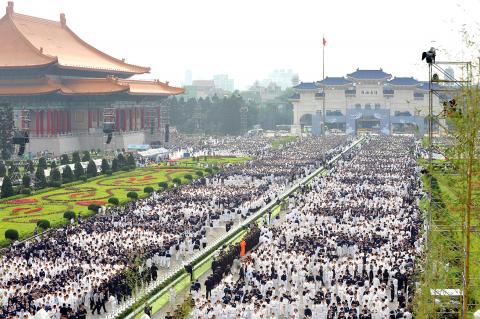Buddhists, politicians and diplomats gathered in front of the Presidential Office yesterday to celebrate Mother’s Day and the 2,633rd birthday of Sakyamuni Buddha.
Thousands gathered on Ketagalan Boulevard on what was the third time the annual event had been held outside the Presidential Office.
This was also the first time President Ma Ying-jeou (馬英九) did not personally attend the event.

Photo: Patrick Lin, AFP
Ma, who was in Greater Tainan in the morning, phoned in and gave his greetings, which were broadcast to the crowd.
Vice President Vincent Siew (蕭萬長), who attended the event on Ma’s behalf, said the occasion held profound significance as it commended the benevolence of Sakyamuni Buddha and recognized the devotion of all mothers.
“We also want the world to see Taiwan’s democracy, freedom and vibrant development of religion,” he said.
The legislature approved a proposal in 1999 to designate the birthday of Sakyamuni Buddha — which falls on the eighth day of the fourth month of the lunar calendar — a national holiday and to celebrate the special occasion concurrently with International Mother’s Day, which is celebrated on the second Sunday of May.
Siew urged the public to practice the “three acts of goodness” and the “five harmonies,” adding that if such universal values could reach every corner of the planet, the world would be a better place.
The “three acts of goodness” refer to doing good deeds, saying good words and having good intentions. The “five harmonies” refer to being kind to oneself, sensitive to one’s family, generous to friends, devoted to social harmony and committed to world peace.
The event was organized by the Fo Guang Shan Foundation.
Marking the Bathing Buddha Festival, Master Hsing Yun (星雲法師), founder of the Fo Guang Shan Monastery, led participants in performing the “bathing Buddha” ritual where he held a wooden ladle and poured water over a small statue of the Buddha.
Bathing a statue of the Buddha symbolizes a fresh start in life and the care given to newborns. Legend has it that when the Supreme Buddha, Siddhartha Gautama, was born, there were auspicious signs heralding his birth. They describe the sky as blue and clear on his birth, with dragons spurting purified water to bathe him. Since then, Buddhists have celebrated their religion’s founder’s birthday by using fragrant water to bathe the image of Buddha.
Master Hsing Yun said people bathing today were cleansing the impurities of anger and hatred from their minds.
Master Hsing Yun said that Sakyamuni Buddha is a human being, not a god, as a god has emotions.
A god punishes and rewards, “but a Buddha does not do that,” he said.
What a mother gives to her child, he said, is compassion, wisdom, tolerance, generosity and the ability to discipline and guide oneself. As long as a person can discover these treasures, that person could make the best of himself or herself, he said.
A Japanese lawmaker from Yamanashi Prefecture presented a thank-you certificate to Master Hsing Yun issued by Sadakazu -Tanigaki, president of Japan’s Liberal Democratic Party, to thank Taiwan for the NT$5.8 billion (US$1.8 billion) in cash donations and 500 tonnes of provisions given to the country in the wake of the March 11 earthquake and tsunami.

CHAOS: Iranians took to the streets playing celebratory music after reports of Khamenei’s death on Saturday, while mourners also gathered in Tehran yesterday Iranian Supreme Leader Ayatollah Ali Khamenei was killed in a major attack on Iran launched by Israel and the US, throwing the future of the Islamic republic into doubt and raising the risk of regional instability. Iranian state television and the state-run IRNA news agency announced the 86-year-old’s death early yesterday. US President Donald Trump said it gave Iranians their “greatest chance” to “take back” their country. The announcements came after a joint US and Israeli aerial bombardment that targeted Iranian military and governmental sites. Trump said the “heavy and pinpoint bombing” would continue through the week or as long

TRUST: The KMT said it respected the US’ timing and considerations, and hoped it would continue to honor its commitments to helping Taiwan bolster its defenses and deterrence US President Donald Trump is delaying a multibillion-dollar arms sale to Taiwan to ensure his visit to Beijing is successful, a New York Times report said. The weapons sales package has stalled in the US Department of State, the report said, citing US officials it did not identify. The White House has told agencies not to push forward ahead of Trump’s meeting with Chinese President Xi Jinping (習近平), it said. The two last month held a phone call to discuss trade and geopolitical flashpoints ahead of the summit. Xi raised the Taiwan issue and urged the US to handle arms sales to

State-run CPC Corp, Taiwan (CPC, 台灣中油) yesterday said that it had confirmed on Saturday night with its liquefied natural gas (LNG) and crude oil suppliers that shipments are proceeding as scheduled and that domestic supplies remain unaffected. The CPC yesterday announced the gasoline and diesel prices will rise by NT$0.2 and NT$0.4 per liter, respectively, starting Monday, citing Middle East tensions and blizzards in the eastern United States. CPC also iterated it has been reducing the proportion of crude oil imports from the Middle East and diversifying its supply sources in the past few years in response to geopolitical risks, expanding

Pro-democracy media tycoon Jimmy Lai’s (黎智英) fraud conviction and prison sentence were yesterday overturned by a Hong Kong court, in a surprise legal decision that comes soon after Lai was jailed for 20 years on a separate national security charge. Judges Jeremy Poon (潘兆初), Anthea Pang (彭寶琴) and Derek Pang (彭偉昌) said in the judgement that they allowed the appeal from Lai, and another defendant in the case, to proceed, as a lower court judge had “erred.” “The Court of Appeal gave them leave to appeal against their conviction, allowed their appeals, quashed the convictions and set aside the sentences,” the judges